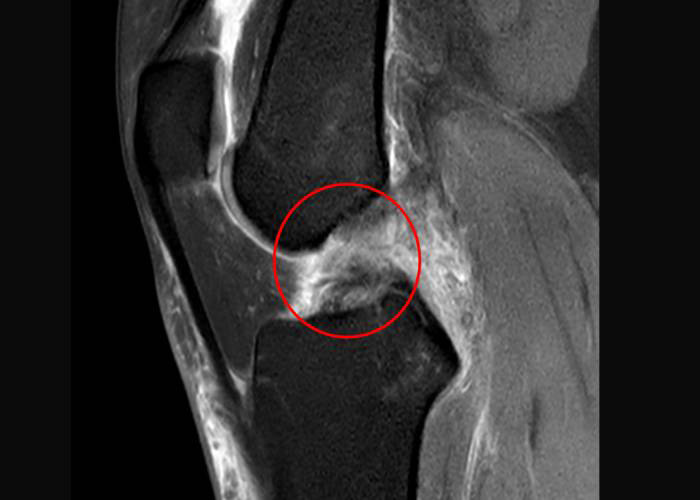ACL Injury Knee Specialist
Did you hear a popping sound and then feel a sudden pain in your knee while playing a sport recently? Is the knee swollen, and you have lost range of motion? If so, you could have an ACL injury. ACL Injury knee doctor, Dr. Prem N. Ramkumar treats patients in Long Beach and serves Los Angeles, Orange County California and surrounding areas who have experienced an ACL injury. Contact Dr. Ramkumar’s team today!

What is an ACL injury?
Injuring the anterior cruciate ligament (ACL) in the knee is very common, especially among athletes of all ages and competitive levels. The ACL is one of the four ligaments that make up the knee and allows the joint to cut and pivot for more explosive or sudden movements. The ACL keeps the tibia (shin bone) in place so it doesn’t slide out in front of the femur (thigh bone). An ACL injury occurs when the ligament stretches too far, and the shin bone slips out from under the thigh bone. Once an ACL injury happens, the stability of the knee joint is at risk and places the surrounding cartilage and meniscus at future risk if left untreated. Dr. Prem N. Ramkumar, orthopedic knee specialist, is located in Long Beach and serves the Los Angeles, Orange County, and surrounding Southern California areas and patients who are experiencing the symptoms of an ACL injury.

How did I injure my ACL?
Some 200,000 ACL injuries occur in the United States yearly. An ACL injury is most commonly caused without contact but can also be caused by a direct blow to the knee. Noncontact ACL injuries occur when an athlete suddenly stops and changes direction. Athletes who play on a field, a court, or those who ski and snowboard have the highest risk of an ACL injury.
Female athletes are also unfortunately two to five times as likely as male athletes to suffer an ACL injury. Research shows this may be because of anatomic and hormonal differences. This may be potentially prevented with neuromuscular training. It is also common to see ACL injuries in athletes who do not condition properly, wear loose footwear, and play primarily on artificial turf.
What are the Symptoms of an ACL injury?
If you suffer an ACL injury, you will likely have one or more of the following symptoms:
- Swelling of the knee (within 24 hours)
- Sudden and severe pain, often on the outside of the knee
- Limited or loss of range of motion
- Hearing a “popping” sound when the injury happens
- Feeling as if your knee will collapse or give way
- Difficulty standing and walking without pain
- Inability to return to the activity or sport where you were injured
How is an ACL injury diagnosed?
In the office, Dr. Ramkumar will perform a thorough history and physical examination of your knee to assess your pain and stability. X-rays of the knee may help rule out any bone damage. An MRI (magnetic resonance imaging) is used to evaluate the condition of the tendons, ligaments, and cartilage and can determine the extent of the ACL injury – a strain, sprain, or tear.
What is the Best Treatment for an ACL injury?
Treating an ACL injury differs from patient to patient and depends on the grade of the injury and the goals of the patient. Although grades are listed below, the knee is either stable or it is not. Dr. Ramkumar’s history, exam, and imaging will delineate this in unclear cases.
- Grade 1: Mild sprain, least severe
- Grade 2: Partial tear, very rare
- Grade 3: Complete tear, most severe
Dr. Ramkumar will consider several factors, including knee stability and your goals before recommending treatment.
Non-surgical Treatment:
In rare cases, the knee may be stable even if imaging suggests the ACL is injured. Physical therapy to strengthen the surrounding knee muscles may be enough to heal the joint without surgical intervention. Other non-surgical treatments include:
- RICE: Rest, ice compression, and elevation
- NSAIDS (non-steroidal anti-inflammatory drugs): to reduce swelling and relieve pain
- Bracing: To stabilize the knee and promote healing
- Crutches: Remove weight to allow the knee to heal
If non-surgical treatments don’t help heal the ACL and relieve pain, Dr. Ramkumar may recommend surgical intervention.
Surgical Treatment:
An incompetent ACL is no longer attached to a blood supply, and surgery will restore stability and normal knee function. ACL reconstruction surgery usually is performed arthroscopically. Dr. Ramkumar removes the damaged fragments of the torn ACL and replaces them with a soft tissue called a graft. Two types of grafts are available:
- Autograft: A tendon taken from the patient’s patellar tendon, hamstring tendon, or quadriceps tendon
- Allograft: Tissue from a donor, tissue bank, or cadaver. Dr. Ramkumar rarely uses this for patients under the age of 40 years due to its failure rate.
Dr. Ramkumar reconstructs the ACL to restore stability to the knee, preserve the meniscus and articular cartilage, and help patients fully return to their activities. Interest in ACL “repair” has recently resurged. Historically, repairing the ACL was met with an unacceptably high failure rate and there are modern technologies attempting to augment techniques for ACL repair. Presently, however, there is insufficient data to demonstrate ACL repair is at least as predictable and safe as an operation as ACL reconstruction.


